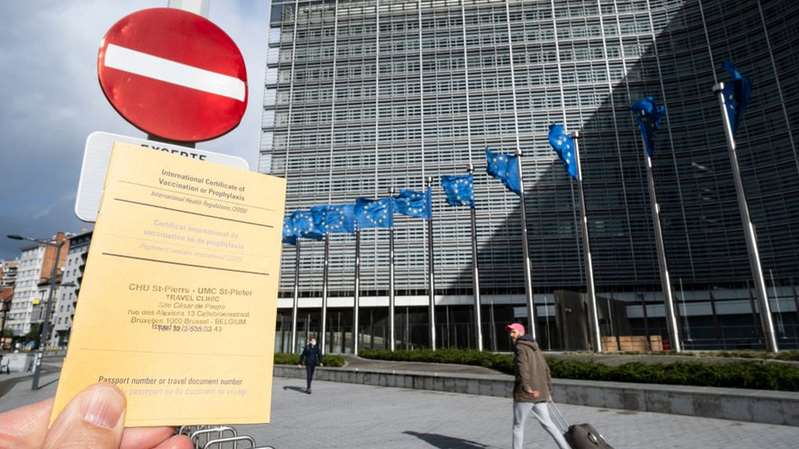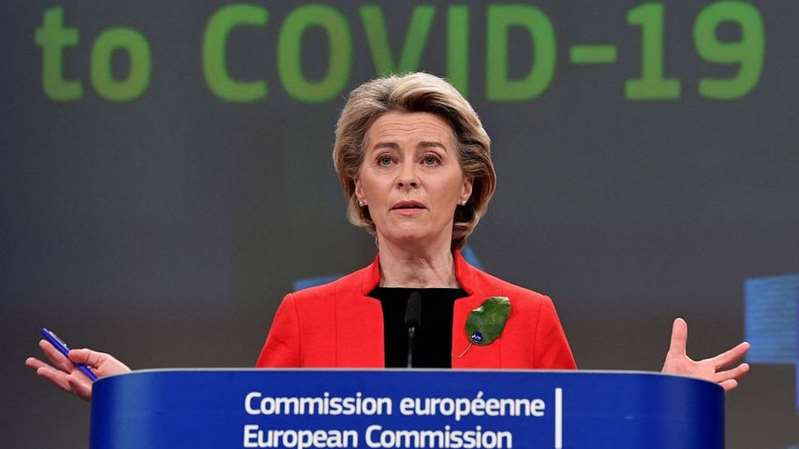
International vaccination passports or “yellow cards” have existed for a long time – they are received by travelers who have been vaccinated against cholera, diphtheria, yellow fever, etc. Now the European Commission is proposing to introduce electronic certificates of vaccination against covid.
Before the start of the tourist season, the European Commission proposed introducing a single “digital green certificate” in the European Union – a document according to which people who have been vaccinated against Covid-19, have had it or have just passed tests with a negative result, could freely travel across the continent.
“This certificate will contain information about vaccinations, test results and past illness. It will also contain a minimum set of data that will be recognized by all EU countries,” said European Commission President Ursula von der Leyen on Wednesday.
According to the European Commission, the holders of such certificates should be allowed to travel within the European Union without being subject to mandatory quarantine.
As the campaign unfolds, such people would become more and more, and this, as Brussels and the governments of individual EU countries, hope, will help revive the economies badly wounded by the pandemic, especially the economies of countries and regions heavily dependent on tourism.
- Vaccine passports. Will they become a document of a new era
- Russia plans to issue passports of vaccinated
The essence of the European Commission's proposal is that EU countries adopt a single form of digital green certificate and allow each other's citizens who have received such certificates to travel without restrictions.
“Now that the pace of vaccination in Europe is increasing, we need the prospect of a return to the fundamental right to freedom of movement and travel in Europe,” said Manfred Werner, leader of the European People's Party, the largest faction in the European Parliament.
The European Commission has submitted its proposal to the European Parliament, which will hold a debate on the certificate and make some decision, but it is difficult to predict how the idea of a single certificate will be treated by individual EU countries, which will ultimately have the last word in the highest body of the EU – the European Council.
Such certificates are primarily supported by countries with a large share of tourism in the economy.
Greece began issuing its own digital certificates for covid vaccines back in January and has entered into an agreement on the recognition of vaccination certificates with Israel.

The European Commission, led by Ursula von der Leyen, has to balance between the different requirements and approaches of the EU countries to vaccination
On the other hand, a group of EU countries led by France doubts the feasibility of the project – for three main reasons.
First, skeptics say, “vaccination passports,” as they were called when they began to discuss this topic, will lead to discrimination against young people: the elderly are primarily vaccinated, they will also get the opportunity to travel, while young people will remain at home for a long time. …
The European Commission tried to respond to these claims, emphasizing in its proposals that EU countries should not prohibit entry due to the fact that a person does not have a “digital green certificate” – this document should only serve to help in coordinating the fight against the pandemic. Therefore, the European Commission decided not to use even the word “passport” itself.
Secondly, skeptics argue, it is not yet clear how long immunity from vaccinations and after illness lasts, and therefore it is not clear for how long to issue certificates.
- Do you need a coronavirus vaccine and how do the various Covid-19 vaccines work?
- Can you get the coronavirus again? What about the vaccine? Answering questions about Covid-19 immunity
Thirdly, many countries are concerned about the security of personal data of the owners of the new all-European electronic document.
“We have a number of questions and doubts regarding the proposed certificates, including the issue of data protection and the impact on the Schengen area,” the spokesman for the Social Democratic faction quotes The Parliament Magazine.
The BBC Russian Service wrote more about the controversy over “vaccination passports” here.
Recognition of “Sputnik”
Acceptance of the European Commission's proposals for a vaccine certificate could lead to indirect and partial EU recognition of Russian and Chinese vaccines, Sputnik V and Sinopharm, even before they were certified by the single EU regulator, the European Medicines Agency (EMA).
On the one hand, the European Commission proposes to make it mandatory for the EU countries to mutually recognize vaccination certificates only with those vaccines that are approved by the EMA.
But on the other hand, the EU countries have the right to independently approve the use of vaccines, without waiting for the EMA's decision, and Hungary and Slovakia have already purchased consignments of the Russian Sputnik V, and Hungary also bought Sinopharm.
In this regard, the draft decision on a single certificate says that the compulsory recognition of vaccinations with vaccines recognized by the EMA “should not exclude the recognition by member states of certificates of vaccination with other vaccines against Covid-19.”
That is, if the EU countries agree to free movement with “digital green certificates”, then in order to preserve the unity of the union, they will have to recognize the certificates of Hungarians and Slovaks vaccinated by “Sputnik” and “Sinopharm”.
“This shows the thin tightrope on which the EU has to balance. Officials are simultaneously trying to reconcile different vaccination regimes in different countries, regain freedom of travel to restart the economy, and find a balance between the demands not to give Russian and Chinese vaccines the same status as vaccines. approved by the European Union, and the need to vaccinate citizens as soon as possible, “sums up the European edition of the international publication Politico.

